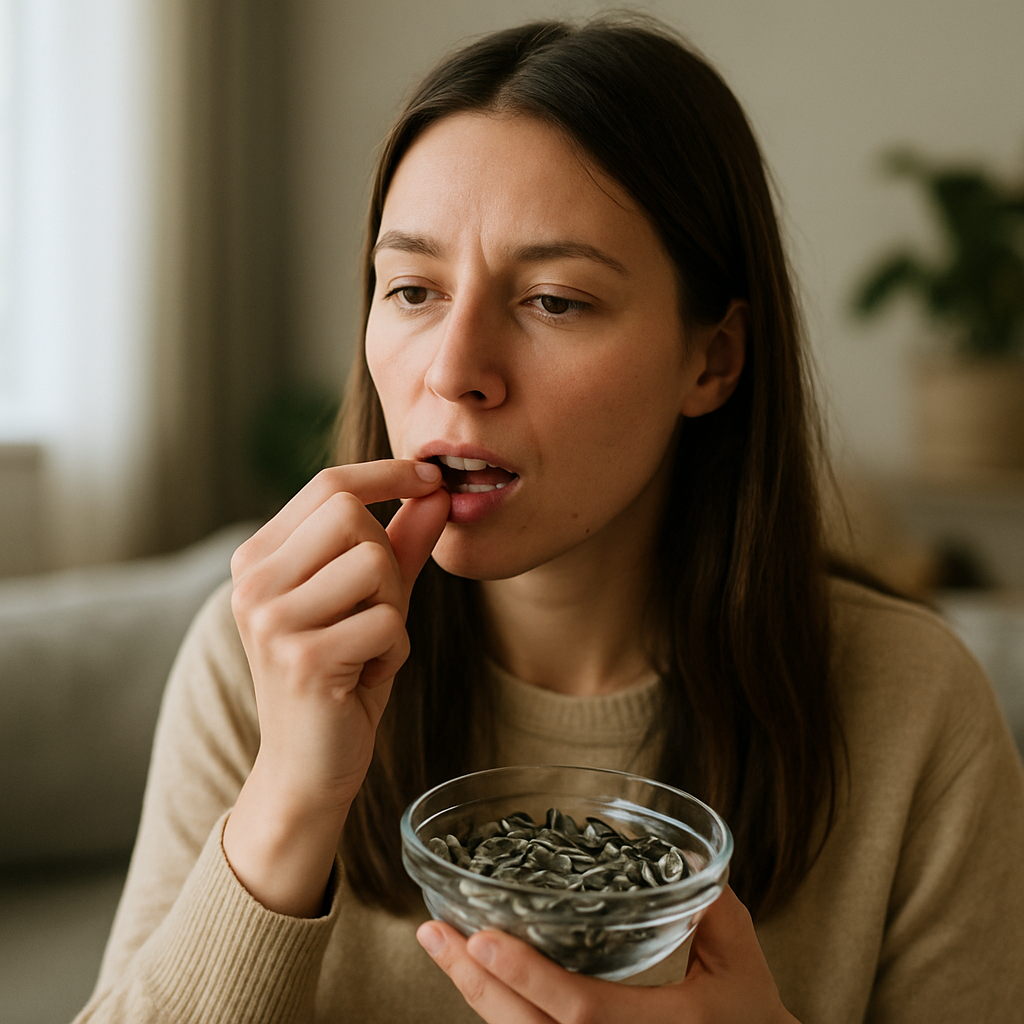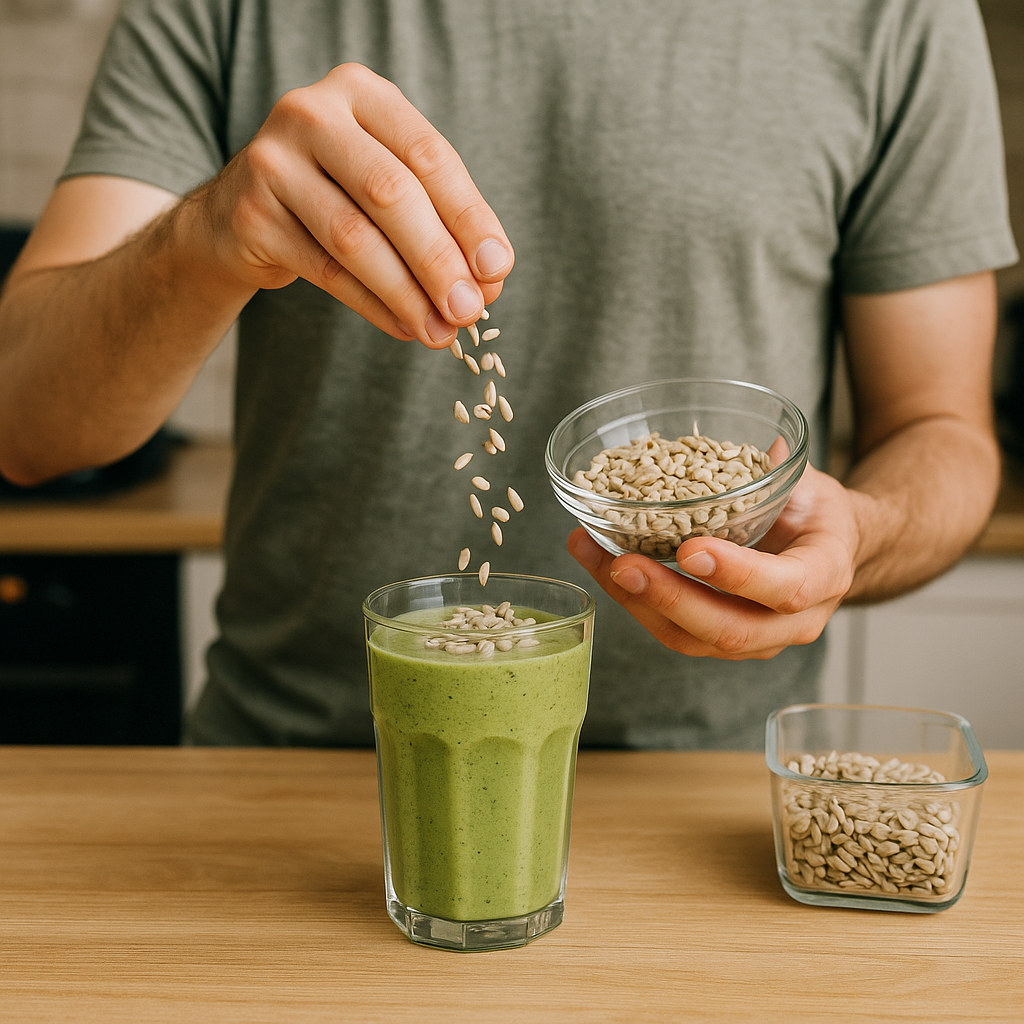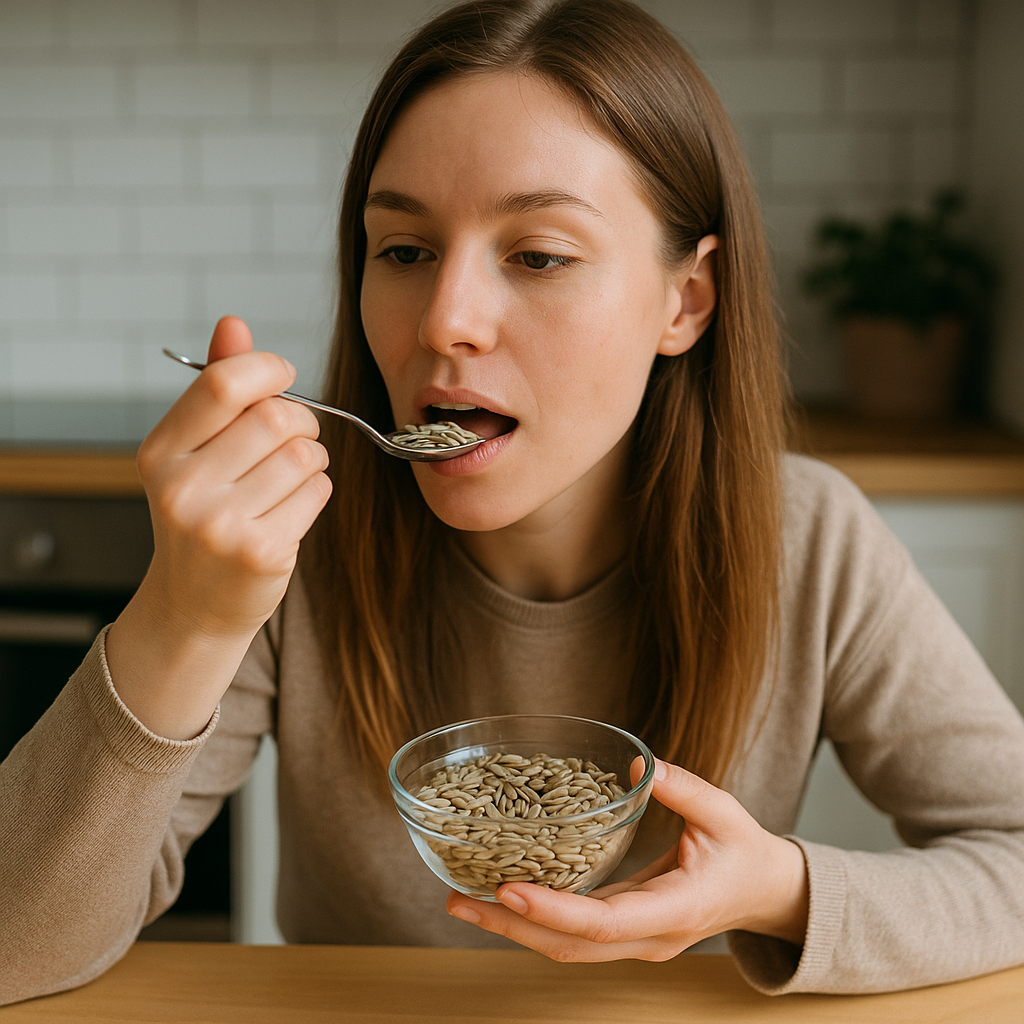आयुर्वेदिक डॉक्टर से प्रश्न पूछें और निःशुल्क या भुगतान मोड में अपनी चिंता की समस्या पर ऑनलाइन परामर्श प्राप्त करें। 2,000 से अधिक अनुभवी डॉक्टर हमारी साइट पर काम करते हैं और आपके प्रश्नों का इंतजार करते हैं और उपयोगकर्ताओं को उनकी स्वास्थ्य समस्याओं को हल करने में प्रतिदिन मदद करते हैं।
How to Consume Sunflower Seeds: Ayurvedic Guide to Eating Them Daily and Safely

Sunflower seeds have been a beloved snack for centuries, but did you know that how to consume sunflower seeds properly can impact your health in surprising ways? From their crunchy texture to their impressive nutrient profile, sunflower seeds are packed with vitamins, minerals, and antioxidants. But many people wonder: can we eat sunflower seeds raw? What’s the best way to eat sunflower seeds for maximum benefits? And how much sunflower seeds to eat daily without overdoing it? Whether you’re curious about adding them to your diet for weight loss, hair growth, or simply as a tasty snack, this Ayurvedic guide will help you understand when to eat sunflower seeds, the best time to consume them, and even some easy recipes to get started.
Let’s dive in!

How to Consume Sunflower Seeds in Ayurveda
Ayurveda, the ancient Indian system of medicine, views sunflower seeds not just as food but as a therapeutic aid. They are considered balancing for the body’s doshas, especially beneficial for Vata and Kapha types due to their warming and nourishing properties. But can we eat sunflower seeds daily for health? Absolutely! Ayurveda suggests that incorporating sunflower seeds into your daily routine can promote energy, support digestion, and improve overall vitality—if eaten the right way.
Can We Eat Sunflower Seeds Daily for Health?
Yes, daily consumption of sunflower seeds can be healthful, but moderation is key. Sunflower seeds are rich in healthy fats, protein, and fiber, making them a great addition to your diet. However, too much can lead to digestive discomfort due to their high oil content. Ayurveda recommends eating a handful (around 20-30 grams) daily, which aligns well with modern nutrition advice. This quantity helps in reaping benefits like improved heart health, reduced inflammation, and better metabolism without taxing your digestion.
Best Time to Eat Sunflower Seeds for Digestion and Energy
According to Ayurveda, the best time to eat sunflower seeds is mid-morning or early afternoon. This timing supports digestion and provides a sustained energy boost during the day. Eating them on an empty stomach might be harsh for some, so pairing sunflower seeds with a small meal or as part of a snack is advisable. Also, avoid consuming them late at night, as their rich oils might disturb digestion and sleep quality.

How to Eat Sunflower Seeds: Raw, Roasted, or Soaked?
When it comes to how to eat sunflower seeds, there are several options — raw, roasted, soaked, or even sprouted. Each method has its benefits and considerations.
Can We Eat Sunflower Seeds Raw or Unhulled?
Yes, can we eat sunflower seeds raw? The short answer is yes, but with a caveat. Raw sunflower seeds retain most of their natural enzymes and nutrients, making them a wholesome choice. However, unhulled (in-shell) seeds are harder to digest and less convenient. Also, raw seeds sometimes contain anti-nutrients like phytic acid, which may hinder mineral absorption if consumed in large amounts. Soaking raw seeds overnight can help reduce these compounds and improve digestibility.
Best Way to Eat Sunflower Seeds for Maximum Absorption
The best way to consume sunflower seeds to maximize nutrient absorption often involves roasting or soaking. Roasting not only enhances flavor but also reduces moisture and potential pathogens. Light roasting preserves most nutrients while improving digestibility. Alternatively, soaking seeds overnight activates enzymes and reduces anti-nutrients, making it easier for your body to absorb key minerals like magnesium and zinc.
Some people prefer a mix of both: soak first, then lightly roast. This combo gives you the best of both worlds — flavor, digestibility, and nutrient density. Adding sunflower seeds to salads, yogurt, or smoothies is another tasty way to consume them without losing their health benefits.

How Much Sunflower Seeds to Eat Daily and Why It Matters
Determining how much sunflower seeds to eat daily isn’t just about portion control; it directly impacts how your body responds to their nutritional benefits. Overeating can lead to excess calorie intake and even digestive issues, while too little might mean missing out on their powerful nutrients.
Ideal Serving Size Based on Ayurveda
From an Ayurvedic standpoint, a moderate amount—about a small handful or roughly 20-30 grams per day—is recommended. This amount aligns with traditional wisdom that emphasizes balance and not overloading the digestive system. Ayurveda teaches that the body’s digestive fire, or agni, needs to be respected. Eating too many sunflower seeds at once might overwhelm this fire, leading to heaviness or bloating.
Eating this portion daily supports natural detoxification processes and nourishes the body without causing imbalance. Remember, moderation is the key—consuming sunflower seeds with mindfulness enhances their benefits significantly.
When to Consume Sunflower Seeds for Weight Management and Hormonal Support
Wondering when to consume sunflower seeds to help with weight loss? The best time would be as a mid-morning or afternoon snack. Their high fiber and protein content help you feel fuller longer, preventing overeating during main meals. Plus, their healthy fats provide steady energy without the sugar crash that comes with processed snacks.
For hormonal balance, sunflower seeds are a natural source of vitamin E and selenium, which are essential for regulating hormones and supporting thyroid health. Including sunflower seeds in your daily diet may help stabilize mood swings and reduce inflammation related to hormonal changes. So yes, learning how to consume sunflower seeds for weight loss and hormonal support can be pretty beneficial if done consistently and correctly.

Sunflower Seeds Recipe and Integration in Daily Diet
If you’re wondering how to incorporate sunflower seeds into your meals easily, there are lots of simple and delicious ways! Whether you want to add them to your breakfast or enjoy them as snacks, sunflower seeds can be versatile.
Sunflower Seeds Recipe Ideas for Breakfast and Snacks
One of the easiest recipes is sprinkling roasted or soaked sunflower seeds over oatmeal or yogurt for a crunchy texture and nutty flavor. You can also blend them into smoothies to add creaminess and nutrition. Another favorite is sunflower seed butter, a great alternative to peanut butter, which you can spread on toast or add to sauces.
For snacks, try mixing sunflower seeds with dried fruits and nuts to make your own trail mix. You can also toss them into salads or roasted vegetable dishes for an added crunch. The options are almost endless!
How to Consume Sunflower Seeds for Hair Growth or Skin Nourishment
Sunflower seeds are rich in zinc, vitamin E, and healthy fats—all vital for healthy hair and glowing skin. Wondering how to consume sunflower seeds for hair growth? Incorporating a daily serving into your diet can nourish hair follicles and reduce scalp inflammation. Vitamin E acts as an antioxidant that protects skin from oxidative stress, keeping it youthful and radiant.
You might also consider making sunflower seed oil a part of your skincare routine or using it as a scalp massage oil. Consuming seeds regularly alongside a balanced diet enhances these beauty benefits from the inside out.
Conclusion
Sunflower seeds are a powerhouse of nutrition that can easily be incorporated into your daily diet for a variety of health benefits. Knowing how to consume sunflower seeds correctly—whether raw, roasted, or soaked—and understanding how much sunflower seeds to eat daily can make a big difference in how your body absorbs and utilizes their nutrients. Ayurveda offers timeless guidance, suggesting moderate intake and the best time to eat sunflower seeds is during mid-morning or early afternoon to optimize digestion and energy levels.
Whether you’re looking to lose weight, support hormonal health, or boost hair growth and skin nourishment, sunflower seeds offer a natural, tasty, and practical solution. They can be enjoyed as a simple snack, blended into recipes, or used as an ingredient in meals. The key is balance and consistency—not just munching on them mindlessly but making sunflower seeds a mindful part of your routine.
So go ahead, add a handful of sunflower seeds to your breakfast bowl or snack on them during the day. Your body—and your taste buds—will thank you! And remember, if you’re unsure about your specific needs, always consult with a healthcare provider or an Ayurvedic expert to tailor sunflower seed consumption to your personal health.
FAQs
Is it okay to eat raw sunflower seeds?
Yes, you can eat raw sunflower seeds. They are packed with nutrients, but soaking them first can improve digestion and reduce anti-nutrients like phytic acid. Eating them raw is perfectly fine in moderation.
How much sunflower seeds should I eat daily?
A small handful (about 20-30 grams) per day is ideal. This amount provides plenty of nutrients without overwhelming your digestive system or adding too many calories.
When is the best time to consume sunflower seeds?
The best time to eat sunflower seeds is mid-morning or early afternoon. This timing helps support digestion, provides sustained energy, and prevents late-night digestive issues.
Can sunflower seeds help with hair growth and skin health?
Yes! Sunflower seeds contain vitamin E, zinc, and healthy fats that nourish hair follicles and protect skin from oxidative stress, promoting healthier hair and glowing skin.

